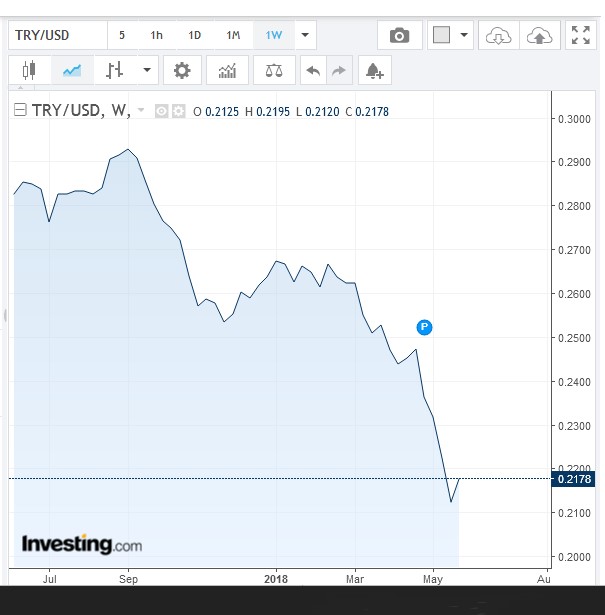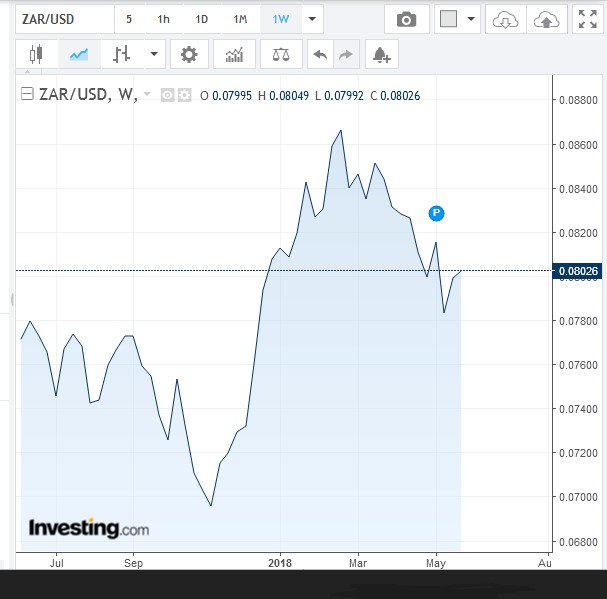Forex traders in Turkey like to joke that the national currency, the lira, is the only real opposition remaining in the country.
The lira certainly is a formidable opponent that has been defying president Recep Tayyip Erdogan's efforts to try and micromanage the country's economy.
After losing nearly 30 percent of its value against the dollar since September, the lira climbed nearly 3 percent on Memorial Day after Erdogan finally bit the bullet and increased interest rates in a bid to stem the currency's slide. He also urged citizens to rally behind him by converting their dollars to lira.

(Click to enlarge)
Source: Investing.com
Last month, Erdogan called for an election on June 24, a full one-and-a-half years before schedule, as he hopes to capitalize on his current popularity.
The president has been fighting against an interest rate hike which, though deemed necessary to dampen inflation and support the lira, would lead to higher mortgage and credit card rates, which in turn could hurt his popularity. He’s hoping to use a snap election to bring in a new system of governance that will increase his powers.
Lira Could Follow Rand Higher
Ironically, the president's delay in hiking rates might have succeeded in achieving just the opposite of what he had intended, with observers now suspecting that the lira's rout might have damaged his chances.
Groups that formerly supported the president, increasingly cast as a strongman due to his domineering style of rule, have peeled away, while some polls have found that he might fail to win an outright majority in parliament and thus be forced into a risky runoff election. Related: Goldman Remains Optimistic Despite Falling Oil Prices
But the lira would hardly complain as it could take a page out of the playbook of its close peer, the South African rand, in case of an opposition win.
The rand managed to shed its tag as the world's most volatile currency when it rallied nearly 25 percent two months after Cyril Ramaphosa took over the reins of power from embattled erstwhile president Jacob Zuma in December 2017 at the ANC elective conference.
The lira has declined sharply due to Turkey’s weak economic fundamentals, double-digit inflation, high reliance on foreign funding and rising interest rates in the U.S.
Rising oil prices have also been weighing in since Turkey is a net oil importer. Prior to the selloff, the lira had been a darling of emerging market traders due to rapid growth of the economy and high yields of Turkish assets.
Rising Rates Bad for Emerging Market Currencies

(Click to enlarge)
Source: Investing.com
ICE Dollar Index 12-Month Change

(Click to enlarge)
Source: Bloomberg
The TRY/USD pair is currently flashing strong buy signals. But rising interest rates in the U.S. and a strong dollar are likely to put a lot of pressure not only on the lira but also on other emerging market currencies.
Since mid-February, the greenback has jumped nearly 12 percent against a basket of major world currencies and reversed some of the gains made by the rand in the Ramaphosa era.
Emerging markets have been suffering a violent shakeout thanks to the Fed's decision to go slow on its money-printing program, much of which was finding its way into these fledgling economies as investors hunted for better returns. Investors ought to keep that in mind.
By Alex Kimani for Safehaven.com
More Top Reads From Safehaven.com:
















